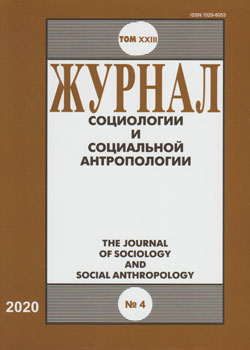Чрезвычайное государственное регулирование распространения COVID-19 в России: бюрократическая логика принятия решений и медикализация повседневностив начале пандемии
Аннотация
The article proposes a textual analysis of emergency by-law rule-making and decisions of federal and regional authorities of the Russian Federation, faced with the need to take strict antivirus measures in the spring of 2020 to prevent the spread of COVID-19 in Russia. Due to the neutral “silence” of the President of the Russian Federation, the active and targeted activity of the Government of the Russian Federation (including non-financial ones), the unlimited departmental rule-making of Rospotrebnadzor and the implementation of the “high alert mode” by the heads of the constituent entities of the Russian Federation in the spring of 2020, emergency and anti-epidemic state measures were introduced significant restrictions activities and movements of persons, including through digital permits, digital control / monitoring and the criminalization of rule violations. At the beginning of the pandemic, restrictions and prohibitions were compulsory and total in nature, legalized the emergency medicalization of everyday life, therefore they received new designations in bureaucratic and philistine discourses — “high alert mode”, “social distancing”, “self-isolation”, “lockdown”, “quarantine”, “social monitoring”, “digital access control”, “distance working / education”. As a result, the heads of the constituent entities of the Russian Federation, certain professional groups (doctors, entrepreneurs, officials, controllers) and ordinary people turned out to be extremely vulnerable in the new unsafe and medicalized reality, knowingly guilty of (bio) ethical and legal meanings in their actions and decisions — as (not) introducing emergency / extraordinary government measures, as well as (not) fulfilling professional duties and deviating from numerous and confusing emergency rules. In this paper, I illustrate the bureaucratic logic of key government actors making emergency spring decisions to prevent the spread of coronavirus infection (2019-nCoV) at the beginning of a pandemic, as well as the legality and effectiveness of “tight government regulation”. The materials for the analysis are more than 60 regulatory legal acts and several hundred regulatory and recommendatory documents adopted and amended at the beginning of the pandemic (in the spring of 2020), as well as used to prevent the spread of COVID-19 in Russia and Moscow.
Литература
Black D. (1973) The Mobilization of Law. Journal of Legal Studies, 2: 125–149.
Black D. (2010) The Behavior of Law. Bingley: Emerald.
Olson M. (1965) Logic of Collective Action: Public Goods and the Theory of Groups. Cambridge, MA: Harvard University Press.
Volkov V.V. (2011) Vvedenie [Introduction]. In: V.V. Volkov (ed.) Pravo i pravoprimenenie v Rossii: mezhdistsiplinarnye issledovaniya [Law and enforcement in Russia: interdisciplinary research]. Moscow: Statut: 3–14 (in Russian).
Volkov V.V. (2017) Empiricheskaya sotsiologiya prava v usloviyakh mezhdistsiplinarnogo sinteza [Empirical sociology of law in an interdisciplinary synthesis]. Sotsiologicheskiye issledovaniya [Sociological research], 4: 34–42 (in Russian).
Kuksa T.L. (2020) Biopolitical decisions and human rights activism during the spread of COVID-19 in Russia: limitations of subjectivity and new boundaries of interdependence. Medical Anthropology and Bioethics, 1(19) http://www.medanthro.ru/?page_id=4825 (in Russian).
Olson M. (1995) Logika kollektivnykh deistvii: Obshchestvennye blaga i teoriya grupp [The Logic of Collective Action: Public Goods and Group Theory]. Moscow: FEI (in Russian).
Paneyakh E.L. (2011) Traektoriya ugolovnogo dela i obvinitel'nyi uklon v rossiiskom sude [The trajectory of the criminal case and the indictment in a Russian court]. In: V.V. Volkov (ed.) Pravo i pravoprimenenie v Rossii: mezhdistsiplinarnye issledovaniya [Law and enforcement in Russia: interdisciplinary research]. Moscow: Statut: 150–177 (in Russian).
Tamanakha B. (2014) Ponimanie pravovogo plyuralizma: ot proshlogo k nastoyashchemu, ot lokal'nogo k global'nomu [Understanding legal pluralism: from the past to the present, from local to global]. In: Paneyakh E.L. (ed.) Pravo i pravoprimenenie v zerkale sotsial'nykh nauk: khrestomatiya sovremennykh tekstov [Law and enforcement in the mirror of social sciences: a reader of modern texts]. Moscow: Statut: 145–183 (in Russian).
Titaev K.D. (2011) Praktika rossiiskikh arbitrazhnykh sudov s tochki zreniya sotsiologii prava [The practice of Russian arbitration courts from the point of view of the sociology of law]. In: V.V. Volkov (ed.) Pravo i pravoprimenenie v Rossii: mezhdistsiplinarnye issledovaniya [Law and enforcement in Russia: interdisciplinary research]. Moscow: Statut: 115–137 (in Russian).

